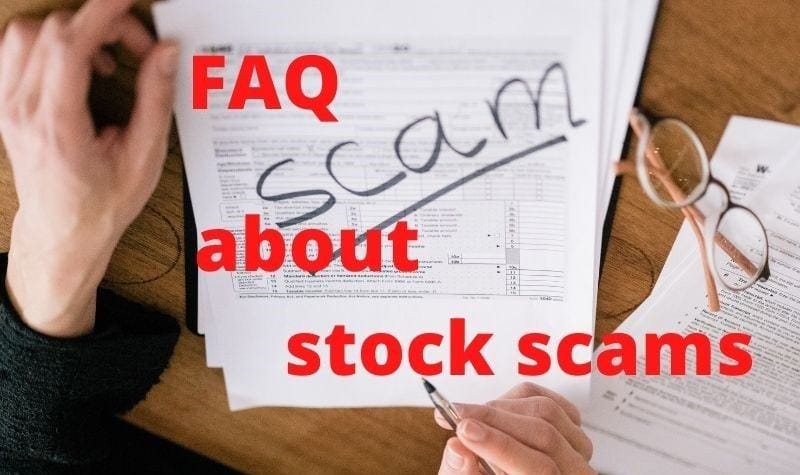The Frequently Asked Questions or FAQ about stock scams investors ask are from lessons on stock scam awareness, detection, and avoidance tips used by superior investors. The lessons, Stock scam awareness defense, and, 4 Stock scam tips, are from the Managing Investment Market Risks course explaining how superior investors manage stock market risks. The answer to each question is linked to the individual lesson. Both this list and the lessons are regularly updated as markets and investments change.
FAQ about stock scams from the lesson,
Stock scam awareness defense
How do stock scams work?
The most common stock scams are pump-and-dump schemes, where crooks use false information in newsletters, social media, and phone calls to pump stock prices, sell their shares for a profit, and leave investors with worthless stock.
Other scams include insider trading and short and distort schemes that illegally buy and sell shares on non-public information to profit, avoid loss, or use false information to drive prices down.
The bad guys' tools include aggressive boiler room sales operations and offshore crooks promoting fake companies or worthless penny stocks. Other schemers use phishing, malware, or social engineering to access and trade brokerage accounts without the owner's knowledge.
Investors can protect themselves by researching before investing.
See more details, discussion, and FAQs in this lesson: Stock scam awareness defense.
Is talking about or promoting a stock illegal?
Anyone can freely talk about a stock, including any they own, and share any facts or opinions they may have.
However, all company insiders must disclose ownership, knowledge, or conflicts and can not share or use non-public information, misstate facts, or mislead the public. That inside group includes officers, directors, executives, managers, and anyone with non-public company information.
As such, people who know or should know can not use inside information to promote, buy, or sell the stock.
Even so, all prudent investors remain aware that scams, lies, and liars exist! So, wise investors avoid hassle or harm by cautiously approaching every market and stock information source.
See more details, discussion, and FAQ in the lesson, Stock scam awareness defense.

Stock scam awareness defense keeps money in your pocket! Use the best defense against scams, awareness! Be informed an do homework on anyone near our money
How do I protect myself from stock scams?
To avoid scams, become an informed investor who conducts thorough research before making investment decisions. Minimize scam risk by focusing on productive assets such as shares of quality dividend-paying companies.
That avoids most stock scams since scams and scammers usually target the riskier parts of the markets.
Savvy investors focused on quality investments avoid most potential risks by knowing who they are dealing with. Besides identifying the parties they deal with, they avoid high-pressure tactics or unsolicited offers.
But the best defense any investor can have is to conduct thorough research to ensure that all the information and filings they use are up-to-date, legitimate, and from reputable sources.
See more details, discussion, and FAQ in the lesson, Stock scam awareness defense.
Is it illegal to mislead investors?
Yes, misleading investors is investment fraud. But catching, proving, and convicting investment crooks is very challenging. And the rare conviction, even jail time, often means recovering little or no money or compensation.
Seeking help after fraud consumes time, energy, and money but guarantees frustration and, most often, little satisfaction. The regulators, police, and legal system, including courts and financial services, have an appallingly, shamefully, uniformly lousy record.
Instead, investors can far better avoid fraud by learning to invest well, including faithfully doing investment homework before any investment. That is the best way to lock out the crooks and scammers.
See more details, discussion, and FAQ in the lesson, Stock scam awareness defense.
Are pump and dump stock promotions illegal?
Pump-and-dump schemes manipulate the price of a stock or security using false, misleading, or gross exaggerations. Although illegal, they remain a common way for scammers to deceive investors.
The scammers start by buying a large inventory of inexpensive micro or small-cap shares. Then, using phone calls and social media, they promote their story and continue as long as their lies lure investors to pay higher prices until they sell out.
Then, they vanish with the funds, leaving only worthless shares behind.
Investors who do their homework avoid falling victim to such scams. Be cautious, check for the seller's registration, reject any pressure sales tactics, and always do the research before investing.
For more details, discussion, and FAQs, see this lesson, Stock scam awareness defense.
What are the most common stock scams?
Pump-and-dump schemes top the list of stock scams, followed by bogus offerings.
Pump-and-dump scams sell worthless stock by promoting it with lies and hype. Victims buy as prices get pumped ever higher.
But the scammers are the sellers dumping worthless stock before running off with the money.
In contrast, bogus offers sell dreams or mythical developments where only the scam is real! Most bogus offerings have no operations, financial statements, or revenue. Scammers collect money for worthless or non-existent units or shares and then disappear to parts unknown.
There are many variations and other scams, but investors can avoid them by following good investment basics. Most importantly, do your investment homework before making any investment.
See more details, discussion, and FAQs in this lesson, Stock scam awareness defense.
FAQ about stock scams from the lesson,
Best stock scam tips

Being aware, on watch and doing your homework provides investors with the best protection against stock scams. Use the best stock scam tips to keep investing safe, fun, exciting, interesting and profitable. The easy to follow tips help keep money in your pocket and working for you.
Are all stocks scams?
Stocks are not scams, but there are scams in the stock market. To avoid scams, wise investors do their homework before making any investment.
That lets mature investors avoid scams and identify the best picks from the thousands of legitimate investments. Doing the needed research keeps stock market investing fun, engaging, and profitable. Any investor can avoid scams by educating themselves to become scam-aware and informed.
See more details, discussion, and FAQs in the lesson, Best stock scam tips.
What is the best stock scam defense?
Keep investing rewarding and enjoyable by always doing your homework before investing. Avoid scams and protect your money with these tips:
1. Avoid stocks listed on the OTC Market.
2. Insist on audited financial statements.
3. Hang up or ignore unsolicited calls, emails, or investment requests.
4. Don't let greed or FOMO (fear of missing out) become a wealth danger.
5. Verify the registration of investments, sales reps, and companies.
Any urgent pressure to invest NOW is a red flag. Just say no!
See more details, discussion, and FAQs in this lesson, Best stock scam tips.
What are the best stock scam tips?
The top twelve tips to protect money from stock scams are,
1. Say no to high-pressure sales tactics.
2. Only invest in well-established markets.
3. Avoid the over-the-counter (OTC) market.
4. Research and understand before investing.
5. Verify sales rep and company registrations.
6. Hang up, cut off, or delete unsolicited contacts.
7. Learn about markets, investments, and investing.
8. Insist on audited financial statements for any investment.
9. Don't follow the herd or succumb to FOMO (Fear Of Missing Out).
10. Learn the difference between investing, trading, and speculation.
11. Manage emotions with the emotional intelligence of a wise investor.
12. Use an Investor Mind to think, feel, and act as a successful investor.
See more details, discussion, and FAQs in this lesson, Best stock scam tips.
How do I spot a stock scam?
It's a scam when the answer is YES to any of the following questions.
Does the seller make you feel obligated?
Do you feel FOMO or Fear Of Missing Out?
Are returns high or guaranteed at low risk?
Are you asked to pay to play or pay to win?
Must you buy now or miss a one-time opportunity?
Are calls and sales pressure persistent and repeated?
Are the contacts and investments a secret opportunity?
Is it too good to be true, a hot tip, or inside information?
Are gift cards, wire transfers, or cryptocurrency needed?
Is the offer unsolicited or from someone you do not know?
Verify the registration of both the company and the sales representative and only trust audited financial statements or credible research reports.
Any intuitive doubts are warning signs; say no and hang up!
See more details, discussion, and FAQs in this lesson, Best stock scam tips.
How do I avoid a stock scam?
To make informed investment decisions and protect their interests, wise investors do their research and analysis to safeguard themselves against scams and bad investments.
Savvy investors have a healthy dose of skepticism, seek multiple opinions, take the time for due diligence, and always verify the registrations of sellers.
So, do the same to avoid stock scams, and invest in yourself to become a knowledgeable and informed investor.
Research before making any investment decision and stay current with changes in the world, markets, and investments.
See more details, discussion, and FAQs in this lesson, Best stock scam tips.
Can a stockbroker steal your money?
Broker theft or fraud is rare, but there are easier ways to abuse client accounts, including mutual fund loading, churning, or pushing new offerings.
Mutual fund loading means filling the account with mutual funds to maximize commissions and recurring annual fees! But that can double client costs over equal ETFs with better returns and lower costs.
Churning happens with unnecessarily buying and selling as advisors churn to earn commissions on trades that offer clients little benefit.
Financial companies earn hefty fees for new offerings, including new issues and additional offerings that flood the market. To place the inventory, advisor quotas and premium commissions force the product into client accounts. But the record shows most produce poor returns.
If you suspect account abuse, act!
See more details, discussion, and FAQs in this lesson, Best stock scam tips.
Links to lessons related to FAQ about stock scams
3 Portfolio building success keys
Additions and edits to FAQ about stock scams will happen as needed
As markets and investments change, the Frequently Asked Questions or, FAQ about stock scams, and the related lessons will be updated as needed. All FAQ responses will have brief answers and links to the full lessons for more details and discussion. These lessons provide in-depth answers from the White Top Investor course, Managing Investment Market Risks.
White Top Investor course, Managing Investment Market Risks includes the lessons and FAQ about stock scams:
Lesson links:
Introduction to Managing Investing Market Risks Lesson 1
Dangerous dividend warning signs Lesson 2
Investor retirement saving dangers Lesson 3
Exotic ETFs blow-up portfolios Lesson 4
Stock scam awareness defense Lesson 5
4 Stock scam tips Lesson 6
Bitcoin fraud trust and psychology Lesson 7
Investors hold patient cash Lesson 8
3 Risk or opportunity signals Lesson 9
Option risks, dangers and opportunities Lesson 10
Cautious look at options Lesson 11
Selling low melts wealth Lesson 12
FAQ about investment market risks Lesson 13
Comment or ask questions on:
Investors ask FAQ about stock scams
You can email me at [email protected].
And subscribe for free to get White Top Investor lessons in your inbox from White Top Investor!
Make money work for you by knowing how investors think, feel and act. Begin building your investor mind here: The Investor Mind.
White Top Investor lessons, website layout, and organization: click here.
Images credits: courtesy FreeDigitalPhotos.net and Unsplash
Lesson code: 325.17.
Copyright © 2011-24 Bryan Kelly
WhiteTopInvestor.com


